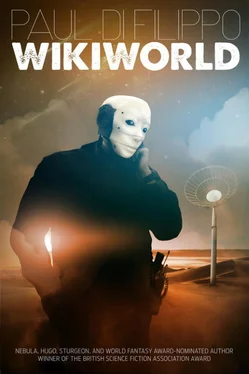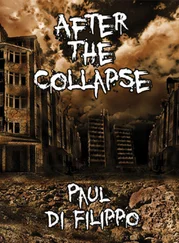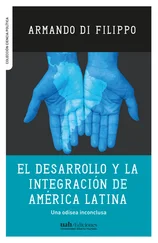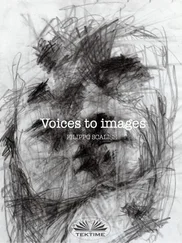Paul Di Filippo - WikiWorld
Здесь есть возможность читать онлайн «Paul Di Filippo - WikiWorld» весь текст электронной книги совершенно бесплатно (целиком полную версию без сокращений). В некоторых случаях можно слушать аудио, скачать через торрент в формате fb2 и присутствует краткое содержание. Город: Toronto, Год выпуска: 2013, ISBN: 2013, Издательство: ChiZine Publications, Жанр: Фантастика и фэнтези, на английском языке. Описание произведения, (предисловие) а так же отзывы посетителей доступны на портале библиотеки ЛибКат.
- Название:WikiWorld
- Автор:
- Издательство:ChiZine Publications
- Жанр:
- Год:2013
- Город:Toronto
- ISBN:978-1771481557
- Рейтинг книги:4 / 5. Голосов: 1
-
Избранное:Добавить в избранное
- Отзывы:
-
Ваша оценка:
- 80
- 1
- 2
- 3
- 4
- 5
WikiWorld: краткое содержание, описание и аннотация
Предлагаем к чтению аннотацию, описание, краткое содержание или предисловие (зависит от того, что написал сам автор книги «WikiWorld»). Если вы не нашли необходимую информацию о книге — напишите в комментариях, мы постараемся отыскать её.
WikiWorld — читать онлайн бесплатно полную книгу (весь текст) целиком
Ниже представлен текст книги, разбитый по страницам. Система сохранения места последней прочитанной страницы, позволяет с удобством читать онлайн бесплатно книгу «WikiWorld», без необходимости каждый раз заново искать на чём Вы остановились. Поставьте закладку, и сможете в любой момент перейти на страницу, на которой закончили чтение.
Интервал:
Закладка:
The two men shook hands. Professor Fluvius said, “I am staying at the Tremont House, Mister Richardson. I anticipate your dining there tonight with me, so that we may refine our plans. And oh, yes, one last matter. I shall need the establishment finished and ready to open its doors in three months’ time.”
“Three months’ time! For an edifice of any sizeable scale? Impossible!”
Professor Fluvius removed two more plump pokes from his pocket and handed them over to Richardson, saying, “That, Mister Architect, is a word we shall not allow to trouble us again.”
I approached the Palace of Many Waters across the modest plaza of varicoloured granite from Barre, Vermont, that fronted its façade. A warm November day, its sunshine still only half exhausted, had left the stones comfortable to my bare feet. But I imagined that neither I nor my sisters would be discommoded even by the arrival of winter.
At my elbow strode the visitor I had met at the train station: Dr. Simon Baruch. Of medium height and trim physique, dressed in a respectable checked suit, he boasted a full head of dark hair and neatly trimmed thin moustache and chin spinach. He walked with a dignified bearing that reflected his past military service, as a surgeon during the War Between the States.
I had met the doctor at the terminus of the Boston and Providence railroad line, adjacent to the Public Gardens. From thence we walked a few blocks riverward, until we came to Beacon, that avenue which bordered the Charles River. We turned left and proceeded a few more blocks to the intersection of Beacon and Dartmouth, where the Palace reared its mighty battlements.
Perched on the banks of the River Charles (one single-storey wing housing the professor’s offices and private quarters in fact extended out on stilts above the flood), the Palace was a fantasy of minarets and oriel windows, gables and slate slopes, copper flashing and painted gingerbread. Like some Yankee version of the famous Turkish Baths of Manchester, England, the Palace seemed a hamam fit for ifrits —to adopt a Muslim perspective.
After demolition of a few inconvenient pre-existing structures, construction of the Palace had been accomplished in a mere ten weeks, without stinting materials or design, thanks to an army of labourers working round the clock; the ceaseless management and encouragement of Mr. Richardson; and a steady decanting of alluvial gold from the seemingly inexhaustible coffers of our dear professor. (And how marvellously I had matured myself in those weeks, almost as if a new personality had been established upon my own nascent foundations in synchrony with the Palace’s construction.)
Our doors had opened in mid-October, just three weeks ago, and in that time the Palace had been perpetually busy. We were open for business seven days a week, twenty-four hours a day, and there were very few stretches when the influx into the Palace was not a copious stream.
Now Dr. Baruch and I stopped hard by the large, impressive main entrance so that he could marvel for a moment at the parade of patrons: mothers with children, horny-handed labourers, clerks and costermongers, urchins and pedlars, soldiers and savants from Harvard and the Society of Natural History. I noted every type of man, woman and child, from the most humble and ragged to the most refined and eminent members of the bon ton , all desirous of becoming clean in a democratic fashion. True, their entrance fees differed, and they would be diverted into different grades of facilities once inside. But all had to enter by the same gate—a gate above which was graven the Palace’s motto:
KEEP CLEAN, BE AS FRUIT, EARN LIFE, AND WATCH,/TILL THE WHITE-WING’D REAPERS COME.
—HENRY VAUGHAN, THE SEED GROWING SECRETLYI noted Dr. Baruch’s gaze alighting upon the motto, and, after taking a moment to apprehend it, he turned to me and said, “An apt phrase from the Silurist, and not without a metaphysical complement to its ostensible carnal focus. Were you aware that the poet’s twin brother, Thomas, was an alchemist?”
“I fear I am uneducated in such literary matters, Dr. Baruch. Our Professor, however, is a man of much learning, and is highly desirous of your conversation.”
Dr. Baruch laughed. “I can tell when I am being politely hustled along. Let us go visit your employer.”
We circumvented the Bailey’s Baffle Gates through which the paying customers had to pass and found ourselves in the Palace’s lofty atrium.
Like most of the interior spaces of the Palace, the lofty, vaulted atrium was tiled with gorgeously glazed ceramic creations, representing both abstract and pictorial designs, the latter of a predominantly marine bent. The hard surfaces granted an echoic resonance to the gabble of voices and footfalls. High stained glass windows rained down tinted light upon the hustling masses as they filed in orderly lines towards the towel-dispensing stations and thence to the disrobing rooms. Naturally, the sexes were separated at this point—save for mothers shepherding children under a certain age—as they would be in the baths.
I guided Dr. Baruch behind the scenes, until we reached the door to Professor Fluvius’s private offices. I knocked and received acknowledgement to enter.
Professor Fluvius’s unique maple desk, a product of the Herter Brothers firm of New York, was shaped like a titanic conch shell. Behind this cyclopean design sat the man whose face was the first visage I had seen upon attaining consciousness. His ivory tresses, longer even than before, fell past the shoulders of his cerulean suit.
Behind him, a window looked out upon the sail-dotted Charles, toward the Cambridge shore. It was cracked a few inches to allow the heady scents of the river inside.
Professor Fluvius ceased fussing with a ledger when we entered, slapping its boards shut decisively, then rose to his feet with a broad smile and came out from behind the desk, hand outstretched.
“Dr. Baruch! A genuine pleasure, sir! Thanks you so much for responding to my humble invitation. I hope to present you with a professional challenge worthy of your talents….”
I hung back near the door, hoping to hear the professor’s proposal, as I was intrigued by Dr. Baruch’s character, insofar as it had been vouchsafed to me in our short acquaintance, and his potential role in our enterprise.
But Professor Fluvius would have none of my impertinent curiosity. Pulling a turnip watch from his pocket, he examined it and then addressed me.
“Charlene, don’t you have an appointment soon with one of your special clients?”
I knew full well who awaited me upon the hour, but dissembled. “Oh, Professor, I had forgotten. Pardon me.”
“No offence needing pardon, my dear. But you’d best be streaming onward now.”
I had perforce to leave their presence then.
But I was not to be stymied from my eavesdropping.
What a change in my nature from the humble, timid deference shown to the professor upon my first foray into consciousness! It was not that I honoured him any the less, nor did my desires deviate significantly from his—insofar as I plumbed either his motives or my own. But I had developed a stubborn sense of my own desires, and a reluctance to be thwarted.
Outside in the hall, I did not head immediately back toward the main bulk of the thronging Palace, but instead approached a nearby window, lowered of course against the November chill. I opened it and peered out.
Some twelve feet below me, the happy waters of the Charles burbled past on their way to the sea, chuckling among the freshly tarred pilings supporting this wing. It would have been a straight, uninterrupted drop to that wet embrace, had it not been for one feature: a kind of catwalk or boat-bumper about halfway down, installed against accidental collisions.
Читать дальшеИнтервал:
Закладка:
Похожие книги на «WikiWorld»
Представляем Вашему вниманию похожие книги на «WikiWorld» списком для выбора. Мы отобрали схожую по названию и смыслу литературу в надежде предоставить читателям больше вариантов отыскать новые, интересные, ещё непрочитанные произведения.
Обсуждение, отзывы о книге «WikiWorld» и просто собственные мнения читателей. Оставьте ваши комментарии, напишите, что Вы думаете о произведении, его смысле или главных героях. Укажите что конкретно понравилось, а что нет, и почему Вы так считаете.










